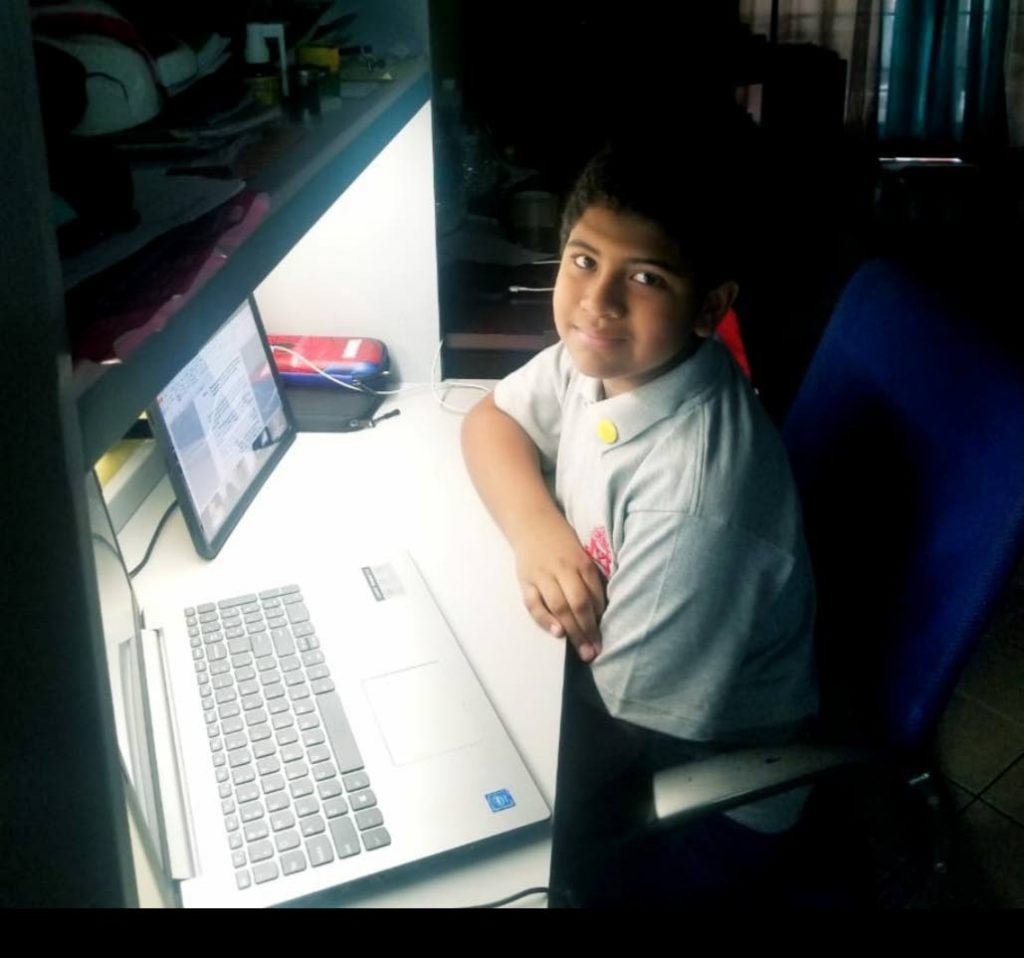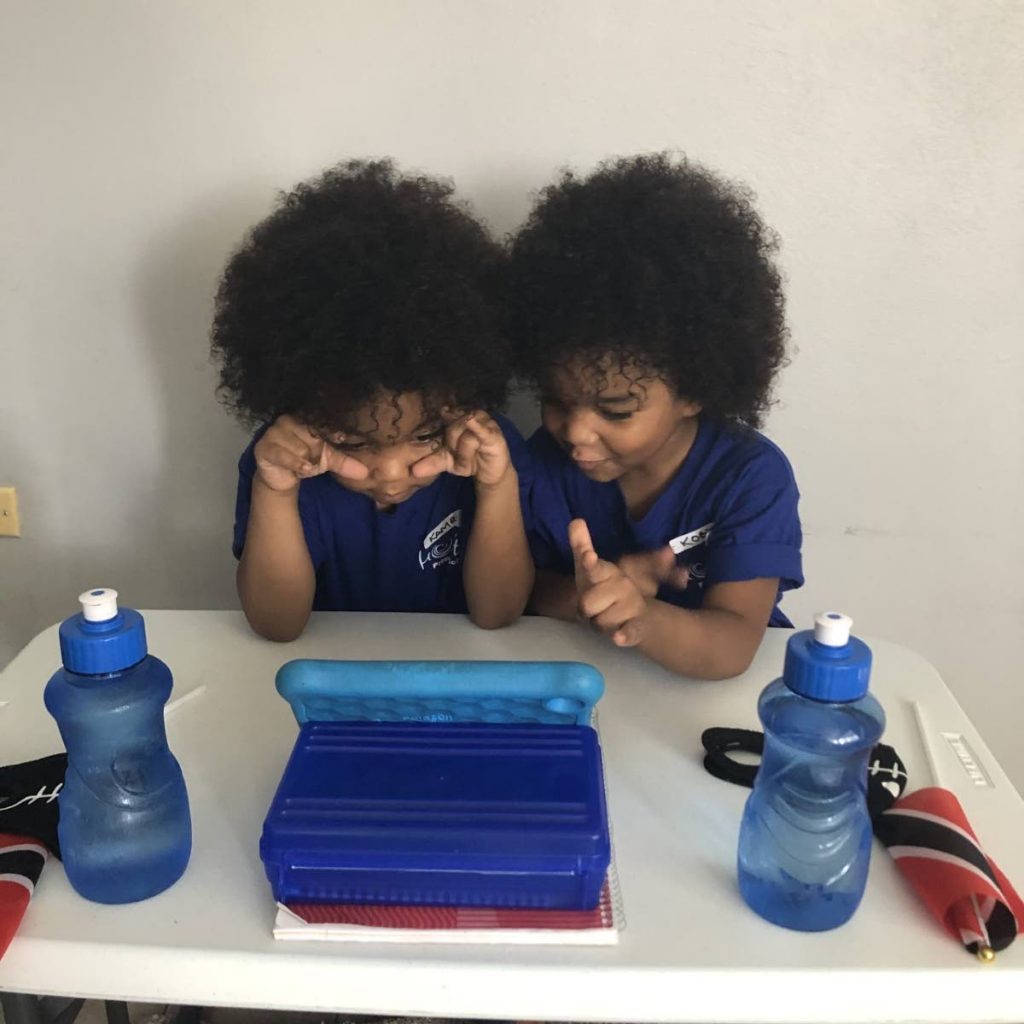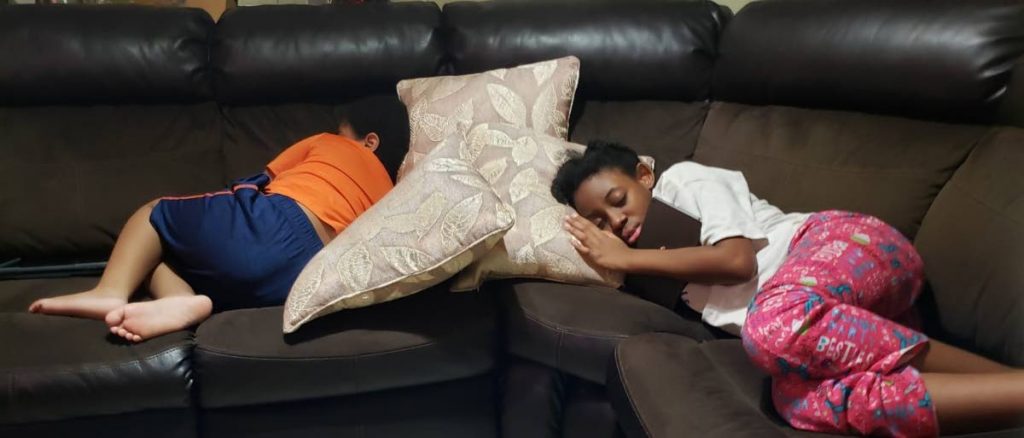How to keep children healthy out of school but on online classes

Consultant paediatrician and adolescent medicine specialist Dr Asha Pemberton says parents have to create the structure their children used to get in physical school to keep them healthy, since they no longer have to leave the home.
“We know there is a lot going on, but we simply have to accept that this is the reality of today, and there are things that need to be done by parents to ensure their children’s wellness today and tomorrow, and that does require some structure and some adaptation.”
She explained there were four aspects to physical health that were affected by prolonged periods of online schooling.
The first was posture.
Pemberton said she understood some parents may not be able to afford to create ideal learning spaces for their children, but they should be mindful of their children’s position as they attend online school and do their best.

Some students had desks and chairs at the appropriate height, she pointed out, while others worked on their beds or kitchen tables, which was not ergonomically correct. This has led to children hunching over, having the screens too close, or having to look up or down at the screen rather than straight ahead so their heads were not in a neutral position.
“So we have seen, in a paediatric context, many people presenting with back pain, neck strain, pain in their lower buttocks area from sitting on hard stools and surfaces over time.
“Ideally they should sit on a table and chair with their device on a stand so they are not looking down all the time but looking ahead directly, the way they would look at a blackboard in school.”
She said children should be discouraged from working on floors, couches and beds as much as possible.
Some also sat too close to the screen, had the screen light too bright, or used headphones that were too loud, which led to eye strain and headaches.
Another aspect was physical activity and movement.
It was recommended that children and teenagers have an hour of brisk physical activity every day for their cardiovascular, muscular and mental health.
“Since children do not have to leave their homes to go to school and there is a shortage of structured activity, a lot of young people have become very sedentary over the past 18 months and will continue to do so.”

She said parents were responsible for incorporating physical movement in their children’s lives.
Pemberton suggested structured physical activity on mornings, to let the children move around and stretch between classes, and if there was time on afternoons, they could do push-ups, squats, or run around outside if there was yard space. They could also follow along to YouTube videos that incorporated household items in place of gym equipment.
Nutrition has also become an issue. She said paediatricians were seeing a rise in disordered eating, as well as overweight or obese children, since they no longer had structured times for meals, but would instead “graze” all day.
“Children and adolescents are allowed free rein in their kitchens and pantries. Many do not have a structured breakfast. They get up, they roll out of bed and to the laptop for school, and just eat and snack all day long – which is obviously not a nutritious option for their overall health and wellness.”
She suggested parents should create a meal plan for the week to avoid the daily stress about what to cook.
Children should have breakfast before class, and fruits, vegetables and water should be available for them to snack on in between classes instead of high-sugar and highly processed foods such as packaged snacks and pack juices. If they are not engaged in physical activity, their lunch should be light – a sandwich or salad; and the evening meal should ideally be with family members so everyone could spend some family time together.
Sleep quality was also affected, as children no longer had to wake up early, move and get ready to leave home to go to school.
“Every single week I see a young person who complains that they wake up tired and they can’t fall asleep and they go to sleep at 2 am. But I quickly ask them, what is your late-night regime?”
She said while chatting with friends online and playing games on devices, the lights, sights and sounds kept the brain active and could reduce the quality of sleep. If sleep quality was poor, they would not be rested, and would wake up tired, having to struggle through the day.

“Although there might be battles over this, the advice to parents is to insist your children put away their devices – laptops, kindles, iPads, phones, everything – at least a half hour – ideally an hour – before bed and engage in another sort of soothing activity which could be reading or just sitting quietly or family time.
“We also encourage people not to sleep in their regular daytime clothes, but to put on night wear, a nightie or pajamas, because the fabrics tend to be soft and feel luxurious against the skin and help put you in that state of calm.”
She admitted the reduction of sleep quality was also a pre-pandemic problem. because parents often allowed children to be on their devices for “relaxation time.” But now that children have to be on their screens for school, parents are not as strict, and children are on their screens more and later than usual.
Pemberton suggested children should be made to wake up early, exercise, eat breakfast, shower, change clothing, have a night time routine and go to bed at a reasonable time.
Other major issues with online schooling were the lack of socialisation and missing milestones.
“Social development and peer-group association are an integral part of both childhood and adolescence. It is actually a pivotal part of adolescent development. The in-person nuance of learning non-verbal communication, dealing with conflict, having allies, communication skills – there are lots of these subtle intangibles that we take for granted that you just don’t get fully in an online environment.”
In addition to education, she said school was a place where students could share their creativity and passion, and leadership and other skills were developed through becoming a prefect, volunteerism, Girl Guides and Scouts.
She also noted that two year groups had advanced from primary to secondary school and had never entered the school compound. It was the same for some who entered sixth form and started tertiary education. They missed the change in uniforms and going to a new school, which were major milestones in people’s lives.
Development and mental effects
Clinical and counselling psychologist Nidhi Kirpalani said online schooling has had many problems including students with limited internet access, limited finances for devices and wifi, and access to education through packets from schools, and in all cases parents had to become pseudo-teachers, as well as providing the children with supervision and support.
That was why, in the early stages of covid19, psychologists and educational specialists urged teachers and parents to focus on the well-being of the child as opposed to academic success. The attention had to be on how students learned and functioned, as opposed to getting good grades, because people, especially children, were not meant to live in isolation, without contact with other people.
“Children learn through play – playing with other children, observing their environment and deciding what is for them, and who they want to become. For example, in pre-school, children learn through using their hands with blocks to count, Playdoh to mould things, and they even mimic adult life by playing 'chef' or 'police officer,' etc.
“This is healthy, natural development. According to the Stages of Psychosocial Development, by Erik Erikson, at this age children begin to understand and develop their purpose, what they can or cannot do, and their sense of good or bad.”
She said at the ages of three-five, children usually had energy to run around and play. They develop their muscles and bones in the outdoors and playgrounds, exploring their talents, likes and dislikes.
Between ages six and 11, children learn how to cope in social and academic settings. This is also the foundation for their future academic success.
“At that age we discover, do we want to attend university? Do we find joy in learning? Do we make friends easily or wisely? Do we enjoy socialising for business, or research, even?
"Socialisation is not only for fun and games. We go to work and we interact with persons every day! We go shopping at the market, meeting and greeting others. During school age we try to discover, ‘How can I be good? Am I inferior to others? Or am I competent?’”
She added that at age 11 or 12 children also do the Secondary Entrance Assessment exam, a critical time for children as they truly believed if they were “smart” they would “pass for a good school” and “get a good job.”
For teenagers, friends were usually the most important thing in their lives as they develop their identity. And meeting new people, figuring out who they are, running in the playground and sharing life stories with friends are part of the school experience.
“Do I want to fit in with the athletes? The smart kids? Do I enjoy computers or am I more a tradesperson?
"We develop our values, beliefs and use these to decide who we are and where we want to go in the future, be it career, family, lifestyle, and so on.”
Kirpalani said not only does online schooling not allow this level of socialisation but it also does not allow for exercise. And children find it more fun to "play" races rather than to jog on the spot for exercise.
So now, children were less physically active because they were not moving from classroom to outdoors during the day. Their bodies were more stagnant and became accustomed to sitting slouched and hunched over while staring at a screen. In addition, as with adults who work from home, all her young clients reported more headaches and eye-aches because of the increased screen time.
Psychologically, she has seen an increased fear of socialisation in children, including increased symptoms of anxiety and depression.
“We are seeing a fear of going outside and touching a friend or family member.

"Human touch is so valuable that even before covid there has been research stating that hugging for ten minutes can increase oxytocin, dopamine and serotonin, the 'happy' chemicals that our body produces. Now we teach kids that hugging even 'safe' people can be bad.
What's more, “Children have increased anxiety due to fear of illness, fear of death, etc, as the world has been pushing statistics of those infected and dying each day.
"This constant fear for over a year is exhausting to the body, which has been on constant alert for threats – threats of touching someone, or going outside. Imagine kids being fearful to go outside!”
She explained that, neurologically, when people are presented with a threat, they go into hyperarousal – the fight-flight-or-freeze response. In that state, the brain produces neurochemicals and hormones which causes reactions, such as increasing the heart and respiratory rate, that are beneficial in the short term. But covid19 is a long-term threat and those physical reactions over a long period – long-term stress – can affect people’s health, responses, coping strategies, and defences against depression, anxiety and other mental health conditions.
Asked her opinion on vaccinated children being allowed to return to physical school on October 1, while the unvaccinated had to continue learning online, Kirpalani said, “The world once had great divisions of persons who are black or white. We have persons separated by political parties, race, ethnicity, sexuality and religion.
"Speaking from a non-medical point of view, separating persons who are vaccinated versus non-vaccinated means severing social relationships, causing a dissection of humans, and also creating that sense of superiority or inferiority on both sides. We may be building a society built on hate and disdain for ‘the other side.’
"It's already here in TT, where we have persons saying, ‘You're stupid to not take the vaccine and save your life,’and ‘You're stupid to take the vaccine and not save your life.’"
People's freedom to choose their medical status, she said, appeared to create more hate, segregation, and separation of families, friends, and loved ones than present-day racism or politics.
"Imagine telling children, 'You can't play with Aunty Jenny because she is or isn’t vaccinated.'"
It was unfortunate, Kirpalani felt, that children might lose their best friends, family members and neighbours because of a personal choice, and that was a shame after the huge movement for Black Lives Matter.
If adults could approach the topic with kindness, acceptance, and understanding, she urged, then children could learn to love others – whether they were vaccinated or not.


Comments
"How to keep children healthy out of school but on online classes"